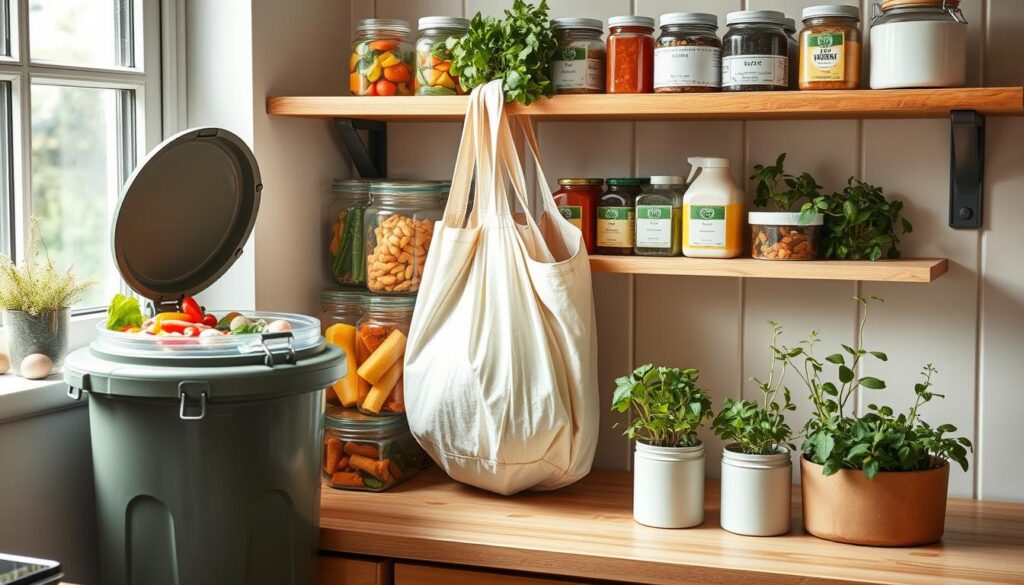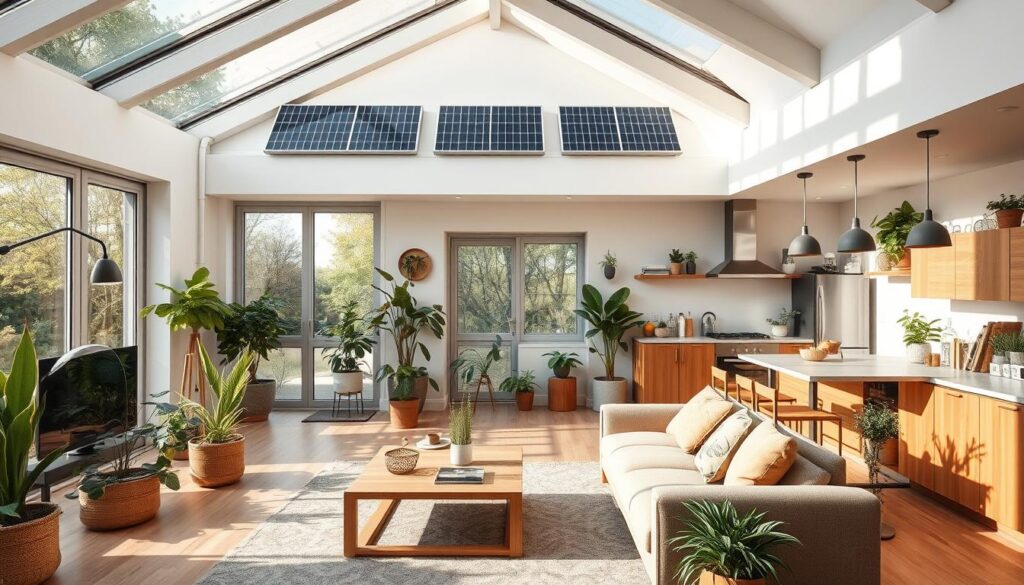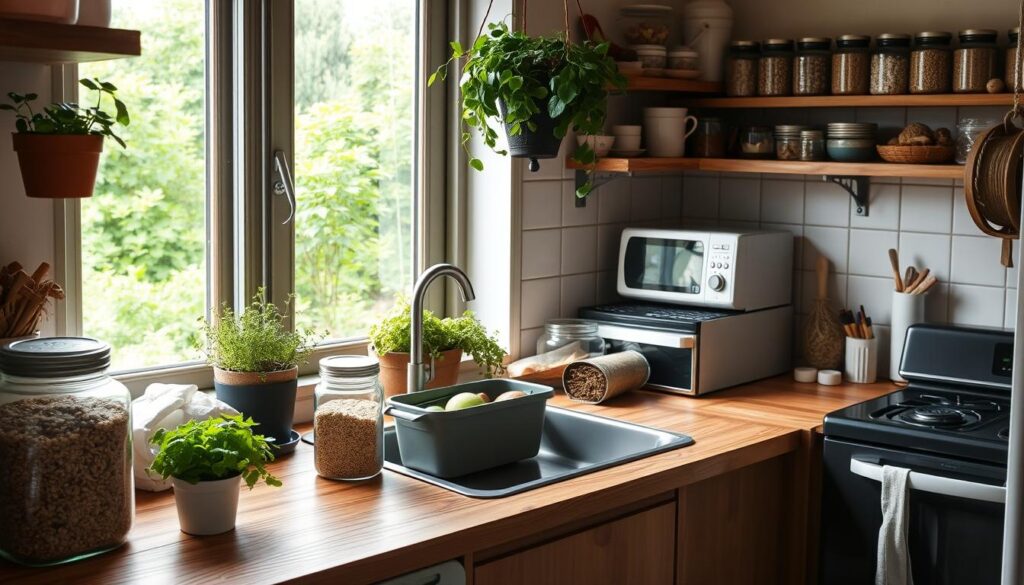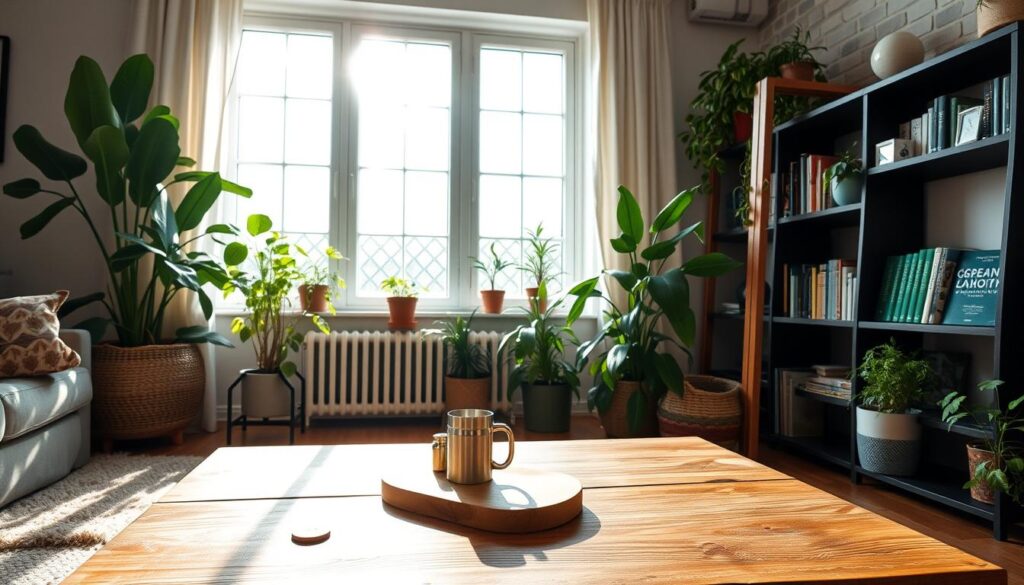היום, בחירה לחיות בצורה בר-תועלתית בבית היא חובה, ולא רק מגמה. אנו מפחיתים את ההשפעה הסביבתית שלנו על ידי קבלת החלטות חכמות יומיומיות. גם שינויים קטנים באופן בו אנו צורכים אנרגיה ויוצרים פסולת הם חשובים. על ידי קבלת הרגלים ירוקות, אנו עושים הבדל גדול עבור כדור הארץ שלנו. מאמר זה יראה לך דרכים קלות ומעשיות להפוך לירוק. תראה כיצד שלבים פשוטים יכולים להוביל לשינויים גדולים בעולמנו.
מסקנות מרכזיות
- הבנת קיימות היא חיונית לחיים משפיעים.
- שינויים קטנים יכולים להוביל לתועלות סביבתיות משמעותיות.
- החלטות במשפחה משפיעות ישירות על בריאות האקולוגית.
- קבלת שיטות ירוקות יוצרת בית ירוק יותר.
- התרומה של כל אדם חשובה למען קיימות.
הבנת קיימות בחיי היומיום שלך
קיימות היא יותר מאשר רק מחזור. זה עניין של קבלת החלטות ידידותיות לסביבה בכל יום. הרעיון מבוסס על שלושה עמודים: קיימות סביבתית, חברתית וכלכלית. כל אחד מהם עוזר לקבוע כיצד אנו משפיעים על כדור הארץ.
הצד הסביבתי הוא על שמירה על משאבים והגנה על הטבע. צעדים פשוטים כמו חיסכון במים, חיתוך בשימוש בפלסטיק ושימוש במכשירים יעילים עוזרים המון.
הקיימות החברתית דואגת לבריאותם של האנשים והקהילות. על ידי קנייה מקומית, אנו עוזרים לכלכלה שלנו ובונים קהילה. בחירה במותגים קיימים גם אומרת תמיכה בשיטות אתיות.
הקיימות הכלכלית היא על לחשוב לפני קנייה. זה מלמד אותנו להעדיף איכות מעל כמות. זה מראה כיצד הבחירות שלנו משפיעות על התמונה הכלכלית הגדולה, מדגישה את ערך החיים הקיימים.
הנה טבלה המראה כמה קל לממש קיימות:
| תרגול | השפעה על הסביבה | יתרונות |
|---|---|---|
| שימוש בשקיות רב פעמיות | מפחית את הפסולת הפלסטית | עלות-יעיל וידידותי לסביבה |
| מיצוק פסולת מזון | ממזער את הפסולת בטיחות | יוצר קרקע עשירה בחומרים מזינים |
| מעבר לנורות LED | מוריד את צריכת האנרגיה | מפחית את חשבונות החשמל |
לקבלת החלטות ידידותיות לסביבה בחיינו היומיים מעלה את הרגש ועוזר לכדור הארץ. לדבר על קיימות מעודד אחרים לפעול גם. כך, אנו עובדים יחד לעתיד ירוק יותר.
שיטות קלות להפחתת פסולת
פעולות פשוטות בבית יכולות להפחית באופן משמעותי את הפסולת. על ידי התחלת קומפוסט, שימוש בפריטים נגישים ועבודה דיגיטלית, אנשים יכולים לשנות את ההרגלים היומיומיים שלהם בדרכים משמעותיות.
השתמש בקומפוסט
קומפוסט הוא דרך חכמה לטפל בפסולת אורגנית. זה מתחיל ביצירת אזור קומפוסט בבית לדברים כמו פסולת מזון ופסולת גינה. השיטה הזו עוזרת להפחית את הזבל ויוצרת קומפוסט נהדר לגינות. הנה איך להתחיל לעשות קומפוסט:
- מצא את המקום או הכלי הנכון בחצר שלך.
- ערבב דברים ירוקים (כמו פסולת מטבח) עם דברים חומים (כמו עלים).
- שמור על לחות ואוויר טוב כדי לעזור לו להתפרק.
שימוש בכלי נגישים לשימוש חוזר
בחירת קופסאות רב פעמיות עוזרת למנוע שימוש בפלסטיק חד פעמי. חברות כמו Glasslock ו-Tupperware מציעות מוצרים לכל צרכי האחסון שלך. מוצרים אלו לא רק מפחיתים את הזבל אלא גם חוסכים כסף. כדי להשתמש בפלסטיק פחות, ניתן לעשות את הבא:
- להביא בקבוק מים רב פעמי במקום לקנות בקבוקים חד פעמיים.
- לשמור על שאריות בצנצנות זכוכית.
- לקחת שקיות בד כאשר אתה קונה, ולדלג על השקיות הפלסטיק.
אלטרנטיבות לשימוש בנייר
המעבר לשימוש בנייר פחות הוא מרכזי לשימוש פחות בנייר. אפשרויות דיגיטליות כמו בנקאות מקוונת וחשבוניות אלקטרוניות חותכות בשימוש בנייר. צעדים אלו עוזרים לניהול כספים קל יותר ומסייעים לכדור הארץ. כדי לחיות בלי נייר, נסה:
- לקבל דוחות אלקטרוניים מהבנקים וחשבוניות מקוונות.
- להשתמש באפליקציות למעקב אחר הוצאות ולשלם חשבוניות.
- לבקש קבלות דיגיטליות במקום קבלות נייר.

| תרגול | יתרונות |
|---|---|
| מיצוק פריטים אורגניים | מפחית את הפסולת בטיחות ומעשיר את האדמה |
| קופסאות רב פעמיות | ממזער את השימוש בפלסטיק וחוסך עלויות |
| פתרונות ללא נייר | מפחית את צריכת הנייר ומקלים על הפיננסים |
יעילות אנרגטית: ירידה בצריכת האנרגיה שלך
שיפור יעילות האנרגיה של ביתך עושה יותר מאשר חוסך כסף. זה תומך גם ב אנרגיה ירוקה. שינויים פשוטים יכולים להוריד משמעותית את כמות האנרגיה שאתה משתמש בה.
אחת הדרכים הפשוטות ביותר לחסוך באנרגיה היא על ידי החלפת התאורה ל-LED. נורות LED משתמשות עד 75% פחות אנרגיה מאשר נורות בסגנון ישן ונמשכות הרבה יותר. בנוסף, בחירה במכשירים יעילי אנרגיה יכולה לעשות הבדל גדול. מכשירים אלה משתמשים בפחות אנרגיה מבלי לאבד בביצועים.
טרמוסטטים חכמים נותנים לך שליטה טובה יותר על החימום והקירור שלך. הם לומדים מה אתה אוהב ומתאימים כדי לחסוך באנרגיה. וגם, ודא שהבית שלך כשיר טוב וחופשי מזרימות אוויר הוא גם חשוב. זה שומר על טמפרטורות פנימיות יציבות ומוריד את עלויות החימום והקירור.
אל תשכח את הכוח של אנרגיה מתחדשת. פאנלים סולאריים יכולים לחתוך באופן משמעותי בהסתמכות שלך על אנרגיה לא מתחדשת. הם עוזרים להפחית בשימוש באנרגיה ולהפחית בפליטת גזים מזיקים.
שימוש בטיפים אלה לחיסכון באנרגיה עוזר לכדור הארץ ומתאים למטרות של חיים ירוקים יותר. תבדוק את הטבלה הבאה המציגה דרכים שונות לחסוך באנרגיה והשפעותיהן:
| שיטת חיסכון באנרגיה | הפחתת צריכת אנרגיה (%) | יעילות כלכלית ($) |
|---|---|---|
| מעבר לנוריות LED | 75% | נמוך |
| מכשירי חשמל יעילי אנרגיה | 25%-50% | בינוני |
| טרמוסטט חכם | 10%-20% | בינוני |
| בידוד וסגירת פתחים | 20%-30% | בינוני |
| פאנלי סולאריים | עד 100% | גבוה |

קיימות במטבח
להפוך את המטבח שלך לידידותי לסביבה הוא צעד חשוב לעבר חיים ירוקים. ניתן לעשות זאת על ידי בחירת מזון מקומי ובעונה. בנוסף, נסה שיטות בישול שטובות לכדור הארץ. למידת הרגלי מטבח קיימים חשובה.
בחירת מזון מקומי ובעונה
שימוש במזון מקומי ובעונה הוא מרכזי למטבח ירוק. רכישה מחקלאים מקומיים עוזרת לקהילה שלך ומפחיתה את הזיהום מהמשלוחים של מזון. מזונות שגדלים בעונתם המתאימה טעימים יותר ובריאים יותר.
- מעודד תמיכה קהילתית דרך חקלאות מקומית.
- מפחית את ההשפעה הסביבתית על ידי הגבלת התחבורה.
- מקדם ייחודיות ביולוגית דרך בחירה מגוונת של צמחים.
שיטות בישול ידידותיות לסביבה
שיטות בישול ירוקות עושות את המטבח שלך יותר קיימות. בישול בקיטור ובבישול איטי שומרים על יותר חומרים תזונתיים במזון שלך ומשתמשים בפחות חשמל. בישול ארוחות בכמויות גדולות חותך בפסולת וחוסך באנרגיה.
| שיטת בישול | יעילות אנרגטית | יתרונות בריאותיים |
|---|---|---|
| בישול בקיטור | נמוך | שומר על ויטמינים |
| בישול איטי | בינוני | מרכך ומשפר טעמים |
| בישול בכמויות | גבוה | מפחית פסולת וחוסך זמן הכנה |

אלטרנטיבות ירוקות למוצרי בית
בחירת אלטרנטיבות ירוקות למוצרי בית היא מרכזית לקידום קיימות. רבים מהמוצרים הרגילים מכילים כימיקלים חמים שגורמים נזק לסביבה ולבריאותנו. על ידי בחירת פריטי בית קיימים, אנשים יכולים לעזור לשפר את בריאות הכדור הארץ. הם עושים זאת תוך שמירה על יעילות הניקוי והטיפוח האישי שלהם.
פתרונות ניקוי טבעיים
פתרונות ניקוי טבעיים הם בחירה נהדרת. הם ממנים כימיקלים רעילים שנמצאים ברוב המוצרים שנמכרים בחנויות. פריטים נפוצים כמו חומץ, סודה לשתייה ושמנים אתריים הם בטוחים ועובדים היטב. הם עוזרים לבית שלך להישאר נקי וריחני. מותגים כמו הדור השביעי ו־יום ניקוי של גברת מאייר
התמקדות בקיימות. הם מוכיחים שאפשר לשמור על כוח ניקוי גבוה גם כשמתקדמים לקיימות.
פריטי טיפוח אישיים ידידותיים לסביבה
הפעלת בחירות ידידותיות לסביבה בטיפוח אישי היא חשובה. אפשרויות כמו טואלטריות ביודגרדבל וקוסמטיקה טבעית עוזרות להפחתת הפסולת. הן גם מפחיתות את הגלגל הפחמן שנוצר במהלך הייצור. מותגים כמו Ethique ו־Lush מכונים על גיוס אתי ושימוש באריזות פחותות. בחירה בפריטים אלו שמימצאת את הסביבה ומעודדת קנייה חכמה.
| סוג | פתרונות ניקוי טבעיים | טיפוח אישי ידידותי לסביבה |
|---|---|---|
| רכיבים נפוצים | חומץ, סודה לשתייה, שמנים אתריים | סבונים ביודגרדבילים, קרמים טבעיים |
| מותגים | הדור השביעי, יום נקי של מרס מאייר | אתיק, לאש |
| השפעה סביבתית | הפחתת פסולת כימית | הפחתת פסולת אריזה |
שילוב שטחים ירוקים בבית שלך
הוספת שטחים ירוקים לביתך מביאה הרמוניה. זה גם שימושי ויפה לגדל גינות פנימיות. הן מעניקות לנו תחושת שלום וטוב בתוך. מחקרים מראים שצמחים יכולים להוביל לתחושה נפשית טובה ולנקות את האוויר. הם משפרים את מראה הבית שלך ועוזרים לכדי הכללת האוויר בפנים.
הנה דרכים קלות להוסיף צמחים:
- צמחים בכד: בחרו פרחים בהירים או עלים שנראים טוב בבית שלכם.
- גינות אנכיות: דרך חכמה להשתמש במעט מקום ולהוסיף המון ירוק.
- גינות תבלין למטבח: גידול תבלינים כמו בזיליקום או נענע הוא יפה ושימושי לבישול.
אם ברצונך לגדל צמחים שקל לטפל בהם, נסו סוקולנטים או צמחי נחש. הם חזקים ולא דורשים הרבה תשומת לב, מושלמים עבור אלה שחדשים לגינון פנימי. הוספת הצמחים האלה משפרת את החיים שלך. זה גם עוזר לסביבה.
מסקנה
החיים הקיימים יכולים להיות פשוטים. זה כולל בחירות קטנות יומיומיות שמביאות לחיים ירוקים יותר. אנו יכולים להפחית פסולת דרך קומפוסט ובשימוש בפריטים נטולי פסולת. בחירה במכשירי אנרגיה חסכוניים גם עוזרת. השלבים הללו לא רק עוזרים לכדי. הם גם משפרים את חיינו.
חשוב לחשוב על הרגלים שלנו. כולם יכולים לעשות שינוי. אפילו שינוי קטן יכול לשרוד כאחראי. ייתכן שתבחרו במזון מקומי או בניקויים טבעיים. בחירותינו הן המפתח לתמיכה בעולם קיימא.
כאשר כולנו בוחרים באפשרויות קיימות, אנו יוצרים השפעה גדולה יותר. בואו נעודד זה את זה לחיות בצורה ידידותית יותר לסביבה. בכך, אנו מגן על הכדור למעננו ולמעני דורות העתיד. ביחד, בואו נעבוד לעתיד קיימא.








